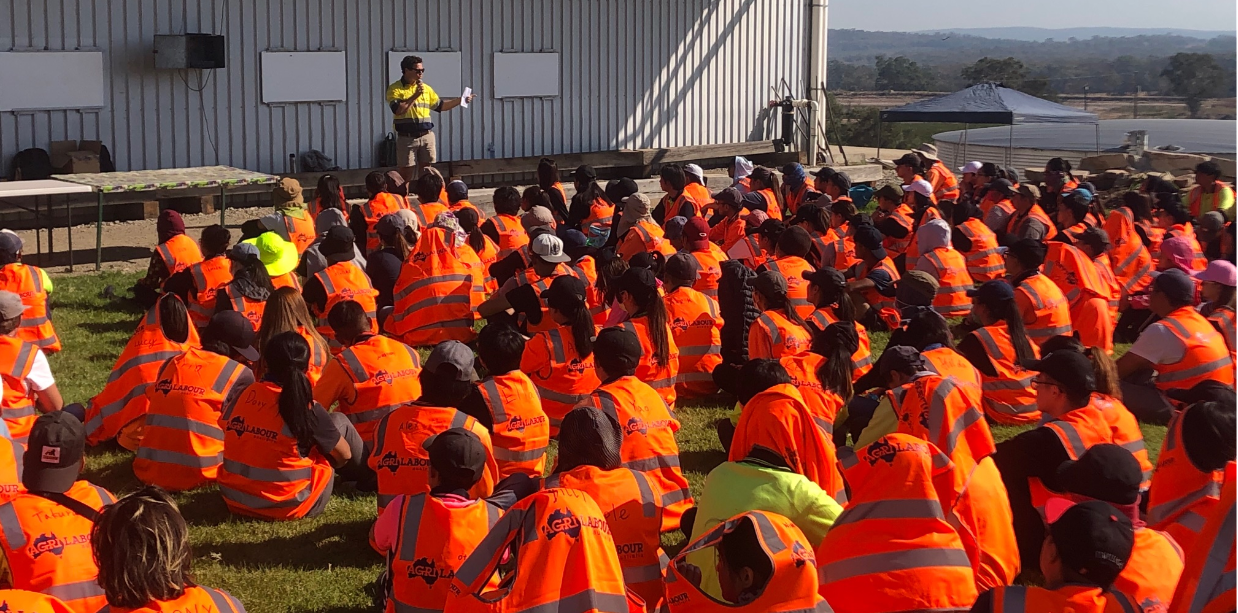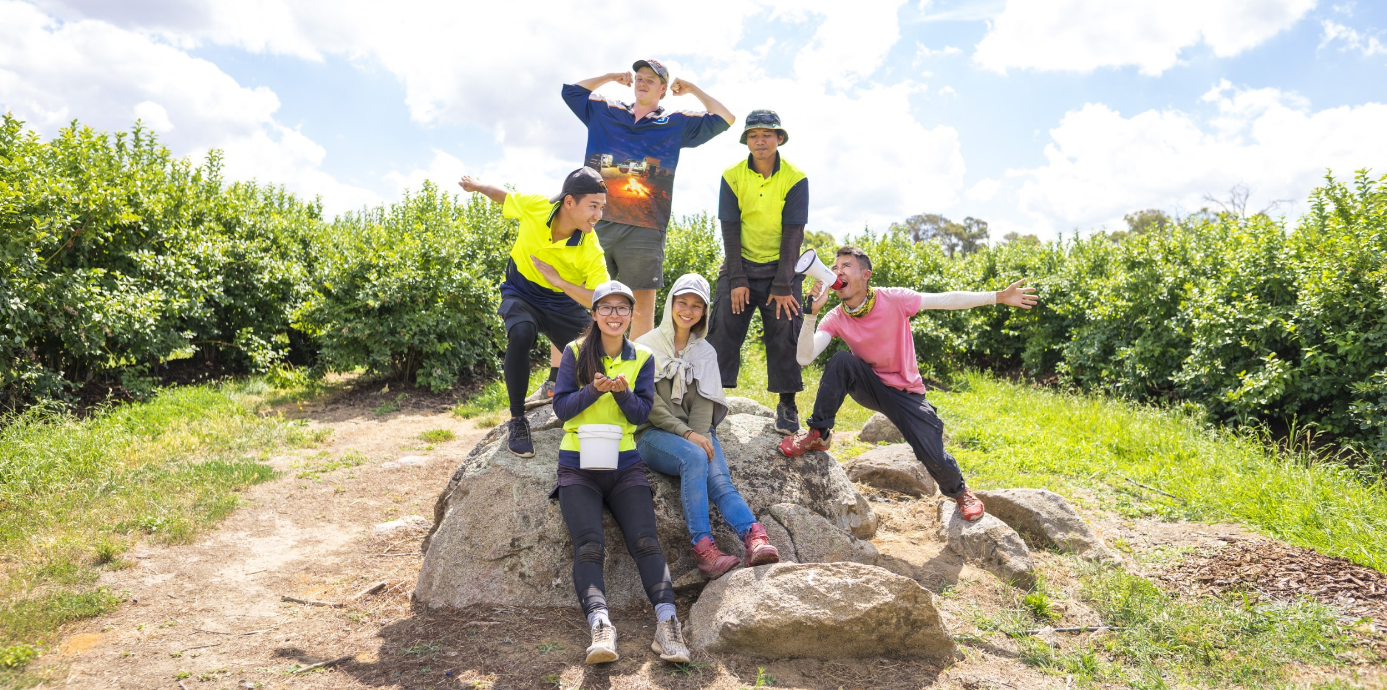By Luke Brown, Commercial Director and Co-Founder Agri Labour Australia
The team at Agri Labour Australia (ALA) are constantly working to expand our capability and uphold our reputation as Australia’s leading agriculture labour hire company. We thrive on challenge and being the very best we can for all our clients and candidates.
Earlier this year we put our skills to the test when we were engaged by one of the country’s largest growers of a highly sought after product. This extremely successful enterprise has been operating for many years and is known for not only being an outstanding producer but also an employer of choice for many seasonal workers.
Keen to explore the potential, ALA Director, Luke Brown approached the owner to learn more about the business and discuss how ALA could assist with their upcoming season.
Following several weeks of discussions, Luke secured the contract and ALA were engaged by the producer to supply 355 staff for a four week project based near a small town in regional SE Queensland.
With just under three weeks lead time to get staff located, trained and operational, the recruitment team got to work utilising ALA’s database of experienced and reliable candidates. ALA’s existing network provided 92% of the required number of staff, leaving us with only a minor number of candidates to source.
The Brief
The annual production is a four week activity that sees the business operating two nine hour shifts per day. The producer would provide their own labour for the evening shift and tasked ALA with providing a full workforce for the morning shift. This required the engagement of over 350 people to work the various roles including; forklift drivers, roustabouts, packers, waste monitors, scanners and supervisors.
Workers would be receiving a piece rate payment, with all work undertaken in a fit for purpose shed located on the producer’s property. No onsite accommodation available.
Workforce Management
ALA understands the requirements of managing such a large workforce and how important it is to ensure little problems don’t quickly turn into big ones when handling a project of this scale. To support this, we located one of ALA’s advisors onsite for each shift to ensure we remained 100% compliant at all times. Having our team member onsite also provided us with a direct line of information regarding any issues that could potentially affect morale and work productivity.
Having the right culture in place goes a long way in staff retention and our minor attrition of only 11% at the end of the season reflects our effective selection, training and people management processes. We have a deep understanding of the cultural diversity among our candidates and how to best connect with and manage these groups of workers.
‘A great deal of ALA’s success comes from us staying connected at the job front and not managing remotely. We know that to give producers exactly what they need from their workforce, we need to experience their business from the front line.’
Luke Brown, Commercial Director and Co-Founder Agri Labour Australia
The Agri Labour Australia team undertook all aspects of the onboarding process for our workers. Candidates were briefed on the specific requirements of their roles including:
- Wage
- KPI’s
- WHS processes
- Information to successfully navigate and connect with the local area
Project Management
ALA’s commitment to being on the frontline enables us to give constant communication on a project and its progress. With our advisor on the ground supervising each shift, we could provide our client with ‘real time’ information updates – delivering transparent data on output, production numbers, staff attendance, QA and other key statistics critical to the business.
This ‘hands on’ supervision is another aspect of ALA’s commitment to ensuring our workforce stays strong, culturally cohesive and productive. For such a short project, it was critical to minimise any staff losses and manage the workforce to ensure productivity stayed at optimum level.
Challenges
The biggest challenge was immediately prior to the commencement of the project with workers trying to find local accommodation for a short period of time. This was quickly addressed and had no negative impact on worker productivity.
There were only two forklift drivers on the floor for each shift. If one was down, the efficiency of production could be affected. In this instance, the problem didn’t arise, however we identified a critical need to have more workers, skilled and ticketed to perform the role when needed.
Results
Producing in excess of 500,000 units per shift, the ALA work crew outperformed themselves each day with minimal waste and zero lost time injuries for the entire duration of the project.
By engaging ALA to supply half the labour required for the entire project, our client significantly reduced their costs and time spent on the onboarding of staff including; administration processes, training, payroll duties and worker management.
Summary
We have surveyed over 200 candidates who have indicated their willingness to return for the 2020 season. The results of the survey also provide us with key data that enables us to continue improving and building on our systems and processes for next year.
The minimal staff loss over the duration of the project supports our established candidate engagement and supervision processes – providing us with excellent measurables to further build upon.
There are a great deal of learnings we take away from this project but most importantly, it is our client’s positive feedback and commitment to engage ALA again that demonstrates our ability to meet and exceed client expectations.
Client Testimonial
‘Agri Labour Australia were proactive in learning our processes and training their staff to follow these systems. Throughout their engagement, ALA staff were willing to take on suggestions for improvement and offered ideas on how to increase efficiencies as they saw them.
Agri Labour Australia was extremely focused on our business requirements and worked towards providing a service that fit our needs. They were fully equipped with existing knowledge of their candidates’ capabilities which assisted them in making the right staff selection for specific roles. They ensured all statutory regulations were followed and shared our commitment of looking after staff.
We would recommend any business to have ALA assist with their staffing needs.’
For more information on Agri Labour Australia and mobilising your workforce, contact 1300 247 823













